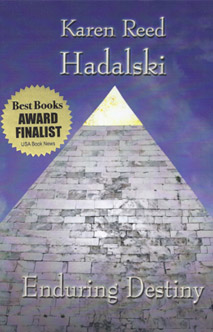A friend was feeling especially “disconnected” from life today; something we all feel at times. After we talked for awhile I forwarded to him today’s “Thought For The Day” which I receive from the Association for Research and Enlightenment each morning.
Its message reminds us that we are always “connected”– even when we are feeling a little lost and alone–to our Creator: “Know thyself, then, to be as a corpuscle, as a facet, as a characteristic, as a love, in the body of God.”
It’s amazing how personal, how spot-on these messages seem to be on certain days–if not for me for someone else in my life. (If you are interested in receiving this free service, go to the www.edgarcayce.org home page, scroll down to the last line, and click on “Edgar Cayce Readings Thought For The Day.”)
I first became aware of the A.R.E. when in my late teens. Through the years I have found its publications, seminars, and study groups to be informative and inspiring in a “non-sectarian” kind of way. If you are at a point where religion/religious affiliation cannot answer all of your questions or fulfill your deepest spiritual nature and longings, the A.R.E. is a good stepping-off point.
Spirituality has nothing to do with being “religious.” In fact, it is often the case that the most “religious,” church-going folks are often the least spiritual, and vice-verse. In any case, whatever your needs and sensibilities might be, the only way any personal path can be natural and authentic is if it is one you employ your God-given free-will to choose for yourself.
The most confused, shallow, unfulfilled people I’ve known are those who have unconsciously, unquestioningly continued on in the faith expression of their parents–the religion they were “raised in.” While there is certainly nothing wrong with eventually choosing the same path as your ancestors, I firmly believe that authentic, free-willed choice must be born of deep thought, exploration, prayer, and counsel.
My quest began around age 12, and I eventually settled-in to an amalgamation of truths/beliefs/disciplines–including a mainstream religious affiliation–which provides a unique “fit” for my individuality and soul purpose. But, this is not static. I continue to follow inner promptings to learn, grow, change, expand when these present themselves. To me, this is the natural way; kind of like the difference between a fresh, clean, lively, babbling- brook and a stagnant, smelly, polluted pond.
If you are at a point of beginning or continuing a spiritual quest, I’d like to leave you with a practical bit of advice given by Tom Kenyon in his “Prelude” to The Hathor Material, p.vii:
“Never swallow or accept as truth anything anyone says without sifting it through your own life experience, your own sense of logic, and, very importantly, your own personal values.
There are those who say you should leave your sense of logic and rational thinking behind when entering into spiritual realms of experience–that you must fully and completely surrender to faith and not let reason enter into the picture.
Personally, I think this type of thinking is dangerous. We need all our wits about us and all the intelligence we can muster if we are not to become deluded on our way to spiritual illumination. It is, after all, the true light of self-awareness that we seek, not the false luminosity of personal fantasy and desire.”



